Kenton Powell, the city manager, highlights the efficiency gains and improved skill levels that come from investing in advanced training. “It helps in two ways, efficiency, and then we can pay for skill, so it’s a win-win for the city and our employees,” Powell states. By prioritizing the development of its workforce, Franklin improves its services and ensures that employees can take on more responsibility and tasks.
David Shuler, a Class 3 water distribution operator, hopes these efforts will instill greater confidence in the community. “Hopefully, it’ll give the community more confidence in city employees being able to do the job and do it right,” Shuler explains. Investing in the education of public works staff has a ripple effect, elevating the entire city.
Josh Huddy, an instructor for the certification program, shares that the main goal is to elevate the education of municipal workers. By doing so, Franklin can rely on its team to handle more advanced projects that other cities might need to contract out. This approach is helping Franklin become more self-sufficient while improving the quality of service.
The benefits of this program extend beyond just technical skills. Jeremy Perring, a Class 4 water distribution operator, points out that the knowledge gained enables staff to answer any questions that may arise when working in the community. “If anybody has any questions, like when we’re out fixing a water leak, we’ll be able to answer them with confidence,” Perring adds.
Ultimately, Franklin’s dedication to combining new technologies with education is setting a standard for other cities. As the city continues to adapt and invest in its workforce, it’s creating a stronger, more efficient system that benefits everyone. This proactive approach to development ensures that Franklin will continue to thrive, making it an example of what can be achieved when a community embraces innovation and continuous improvement.




